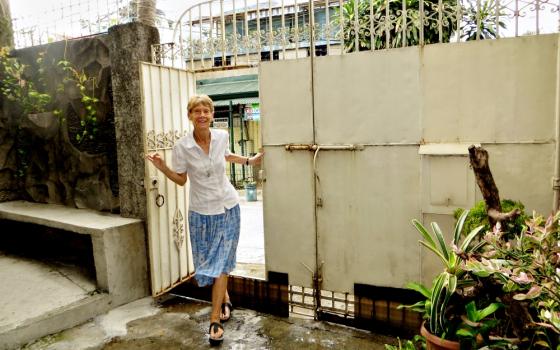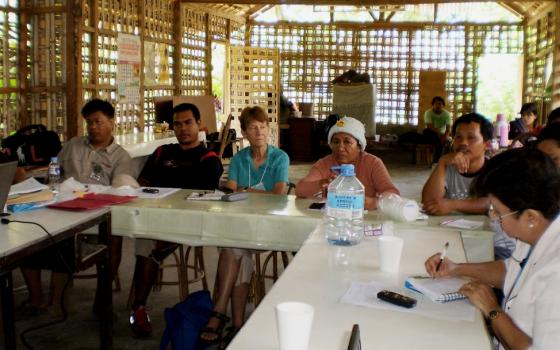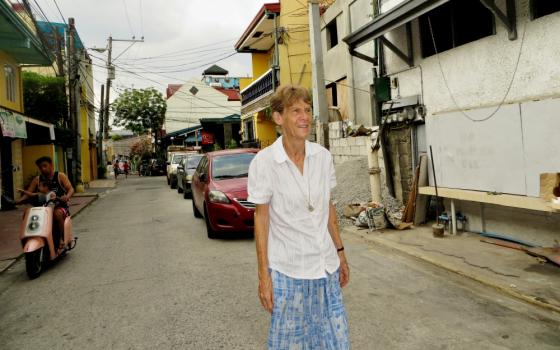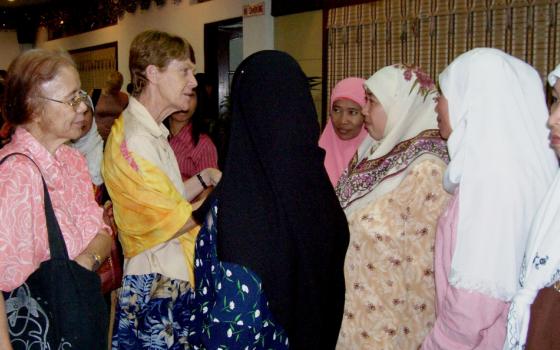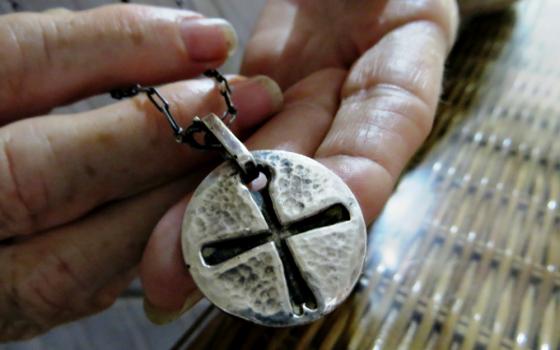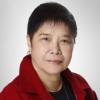Sr. Patricia Ann Fox of the Sisters of Our Lady of Sion has been in the news almost daily in the Philippines since her arrest on the afternoon of April 16 by Bureau of Immigration operatives for allegedly engaging in illegal activities. Fox was released the following day after a 22-hour detention.
Fox, 71, an Australian citizen and a lawyer by training, has been working in the Philippines since 1990.
The day after Fox's arrest and detention, President Rodrigo Duterte's spokesman, Harry Roque, said it could have been all a mistake. But a few days later, Duterte himself reversed his spokesman's statement and said during a public speech that he was the one who ordered Fox's arrest and detention because, he said, she was participating in political activities and speaking against the government.
The case of Fox brings to mind the deportation of foreign priests during the martial law years under the dictatorship of Ferdinand Marcos from 1972 to 1986. Fox is the first religious missionary to be investigated since then.
Church, activist and women's groups have rallied around Fox; among them, the Catholic Bishops' Conference of the Philippines, the Association of Major Religious Superiors in the Philippines and Rural Missionaries of the Philippines. From Rome, Fox's congregation head also issued a statement published in a Philippine broadsheet.
On April 23, the Philippines immigration bureau revoked Fox's missionary visa and gave her 30 days to leave the country, citing "activities not allowed under the terms and conditions of her visa."
In a statement April 25, Fox said she thought she had 10 days to put in a counter affidavit and she was "very sad that the decision at present is that I leave the Philippines."
She said in the statement:
As a Christian, believing that our mission is to bring God's Kingdom to the here and now, I couldn't help but to get involved both with projects, such as training in organic farming, to uplift the livelihood of the farmers, but also to advocate with them for their rights to land, livelihood, peace, justice and security, all universal human rights which the church sees as integral to her mission.
It seems this is what has brought me into conflict with the Philippine Government. I am still hoping for a chance to explain how I see my mission as a religious sister and maybe the decision can be reconsidered.
Whatever happens, I will be forever grateful to all those Filipinos that I call my friends and for all those from both church and sectors who have supported me through this time. I may lose my right to be in the Philippines but I can never lose the learnings and beautiful memories.
The Association of Major Religious Superiors in the Philippines are holding a Mass of solidarity for Fox at 3 p.m. Friday, April 27, at St. Anthony Shrine in Sampaloc, Manila.
GSR spoke with Fox at her home in Quezon City on April 22, Good Shepherd Sunday. Fox, sometimes nicknamed "Sister Foxy" by friends, is a familiar face in the middle-class neighborhood. Neighbors, associates and friends as well as tricycle drivers were surprised to learn about her case.
In the interview, Fox spoke about her life as a missionary in the Philippines and the case against her.
GSR: You arrived in the Philippines in 1990, four years after the People Power Revolt that toppled dictator Ferdinand Marcos and swept Corazon Aquino to the presidency. What was the Philippines like for you then?
Fox: We came upon the invitation of four bishops. It was quite adventurous in those days, as transport wasn't as easy. We chose to go to the Prelature of Infanta [southeast of metro Manila], as the prelature statement gelled with our reason for coming. Everything was new in this different culture. We were used to a verbal culture and not the unspoken messages.
Did you choose the Philippines, or was it an assignment?
In our 1986 congregational chapter, we were called upon to see the world through the eyes of the poor. One of the decisions was to explore an immersion in Asia, where we had no presence and where the majority of the world's population lives. We chose the Philippines, and I volunteered.
Why did your congregation, Our Lady of Sion, choose to come to the Philippines when there are so many religious congregations here? What is your congregation's charism?
Our charism is based on a biblical spirituality. We describe it as reminding the church that her roots are in Judaism and working for the promises of a world of justice, peace and love, first promised to the Jewish people for all. Our founder was Jewish, though a convert, so was always steeped in the word of God in both Old and New Testaments.
We say we have a threefold commitment: to the church, to the Jewish people, and to a world of justice, peace and love.
One of the reasons we chose the Prelature of Infanta was because there were few congregations there at that time, as it was still quite isolated.
Where were you before you came to the Philippines?
Before I came to the Philippines, I had been an elementary school teacher, a community worker; but immediately before I came here, I was working as a lawyer in a community legal center in Melbourne, Australia.
What ministries did you intend to be involved in here? Why?
I had visited the Philippines in 1984 and felt that the church people I met here, including those working for Task Force Detainees of the Philippines and the Rural Missionaries of the Philippines [RMP] at that time, were really living liberation theology, about which I had read a lot but hadn't so much seen in practice. So I had in mind to volunteer with one of those organizations.
As a sister, what were your first involvements? Where?
After traveling around the Infanta Prelature, we decided to settle in the town of Real. We were involved with the catechists particularly. But it was mostly a time of becoming inculturated.
After five years, I was invited to move to the northern part of the prelature, in the town of Aurora, to join the Justice and Peace Action Group of the prelature. There, I became more familiar with agrarian problems and also the threat of mining.
We had joined the RMP in Real, and later, I became the RMP Central Luzon regional coordinator. When I was elected RMP national coordinator in 2000, I moved to Manila. Since then, I have been a member but also volunteering with different peasant groups.
What do you consider important events, milestones and experiences as a religious living and working in the Philippines?
I think my experience of living closely with the poor and their acceptance of me and willingness to tolerate my faux pas and being ever ready to help. I have learned how to analyze society from their perspective.
Where in the Philippines are you and your sisters present, and what type of ministry do you do?
Currently, we have a house in Real, Quezon, and two here in Quezon City, metro Manila. In Real, the sisters are involved in a women's livelihood cooperative and a Grameen banking program called Kumare. We are also involved with the catechists and youth of the parish. One sister has just started work with the Department of Social Welfare and Development there.
In Manila, one sister is studying nursing and another is just finishing religious studies. Another has been teaching in an urban poor kindergarten while finishing a doctorate on social transformation. Another sister tutors in Hebrew and team teaches on biblical studies. I am more involved in peasant advocacy and promoting organic farming.
You were coordinator of Rural Missionaries of the Philippines from 2000 to 2007. What was it like for you?
It was a great experience to get to know the farmers, fisherfolk and tribal people from various parts of the country. It was great to be with the religious and laypeople who were helping organize them for their rights and working in solidarity with them. It was and is a challenge to make these issues integral to the local churches as called by the Vatican II document "Justice in the World." It was also very humbling how I was accepted and not considered as a foreigner!
Could you describe RMP's ministries during your watch?
Very much as today, the RMP had a two-pronged program: peasant advocacy (speaking out on the issues affecting the rural poor and working with them for change) and rural development (providing training, equipment, etc. to help raise the income of the rural poor and allow them to live in dignity).
You speak Filipino. How good are you at it?
I speak it with an Australian accent and describe my Tagalog as "kangaroo Tagalog" as against "carabao English"! But I understand enough and can communicate with people.
You are the first foreign religious to be singled out and investigated for alleged political interference. What particular activities have you participated in that you think put you on the intelligence radar?
The immediate trigger was my participation in an international fact-finding and solidarity mission [to check on reported human rights violations] from April 6 to 9 in Davao.
Describe how the Bureau of Immigration agents came to your residence to take you away.
There were six BI agents who came to my door, one female and five male. They were dressed in uniforms and said they had a mission order for me to accompany them to the BI to clarify some things. I asked if it could be the next day, as no one was in the house with me, and also if I could collect my passport from the travel agent if I needed it. [Fox's travel agent had her passport because Fox had planned to visit Australia in May.] They insisted that it had to be that day.
Fortunately, one of my sisters arrived from Real, and she accompanied me. A mission order was flashed at me, but I had no idea what it meant. I had no worries about clarifying any questions, so I went with them. They treated me OK.
Did you have any inkling or foreboding that this was going to happen? Were you forewarned?
It came as quite a shock.
What were your thoughts, feelings while you were being taken to BI?
At first, I wasn't so worried, but as time went on, it became clear it was more serious. Though on the way, I did text my friends to alert a lawyer.
What questions did they ask you?
Only during an inquest later in the night when my lawyers were there they asked me to identify two photos and if they were rallies.
What activities of yours did they cite that made you worth investigating? Did they say who ordered them to investigate?
It was supposedly joining rallies. One picture was a visit to political prisoners and the other was attending and speaking at an outdoor press conference with Coca-Cola workers who had been dismissed.
Describe your overnight stay.
I was held because I could not produce my passport, only a photocopy, so I was considered undocumented. They did not want to send me to detention in Camp Bagong Diwa, but explained they had no facilities in BI. I stayed the night in the security center. Friends brought me a blanket, pillows and food.
Now your having joined a rally of farmers at Hacienda Luisita in Tarlac province some years back is being brought up, that you were arrested. Is this true?
Again, it wasn't a rally. It was after the Department of Agrarian Reform had implemented the decision of the Supreme Court to distribute the land. There were a lot of anomalies with farmers being given lots far from their houses, being taken to financiers to rent their land. We had a fact-finding mission and had just come from a dialogue with the military when the police came and started arresting people. Some of us went with them. There were 11 of us, including Congressman [Fernando] Hicap. Neither he nor I were charged, but we stayed with the others until they were released.
Do you consider your ministry among the marginalized political?
In a way, all of our activity is political, but it is not partisan political.
Would you advise other foreign missionaries to lie low, not to be involved in human rights work?
I can't see the point of being a missionary and laying low. It is a part of our Christian calling to speak the truth.
Please share your insights about your being a religious sister, a church person, a woman, a follower of Christ in service of the people.
I think it is both an honor and a responsibility to be a religious and follower of Jesus. Given the situation of the world, there needs to be a word of hope that good will overcome evil. It is the people who continue to struggle for a better life that give me inspiration and challenge me to take seriously the Gospel message of Jesus.
[Ma. Ceres P. Doyo is a journalist in the Philippines. She writes features, special reports and a regular column, Human Face, for the Philippine Daily Inquirer.]
